10 Superfoods For Dogs
Andrea Powell
Superfoods are foods that are packed with vitamins, minerals, and antioxidants. They help boost the immune system and fight against diseases. The nutrient-rich foods are not only good for humans, but several are beneficial for dogs as well.
However, you should always consult a veterinarian before making any changes to your pup's diet. The best way to keep your dog happy and healthy is by feeding a high-quality pet food and balanced diet.
But who doesn't love a fresh and tasty treat?
Read on to learn about 10 superfoods that are safe to feed dogs as a treat and why they are called "superfoods".
Blueberries
This sweet berry is on the top of nearly every superfood list, and for good reason. Blueberries are full of antioxidants (highest antioxidant capacity of all fruits and veggies), high in potassium and vitamin C & K, and low in calories.
The berries help lower the risk of heart disease, cancer, and are an anti-inflammatory. Dogs will usually gobble them right up and their small size makes them perfect for dogs big and small.
Green Beans
These low-calorie veggies make a great treat for dogs who are trying to shed some pounds or as a healthy alternative to a dog biscuit. Just remember they need to be plain with no seasonings.
They are high in fiber and full of protein, iron, calcium, and vitamins B6, A, C, and K.
Pears
Fresh pears are full of fiber, vitamins A and C, and are a healthy snack for you and your dog. Some studies even state that eating the sweet fruit can help reduce the risk of a stroke. Plus, they taste amazing.
Just be sure to remove the pit and seeds and cut into small pieces before feeding to your beloved dog.
Carrots
Feel free to share a baby carrot or two with your canine pal. The vegetable is high in fiber, low in calories and fat, full of beta-carotene for their eye health.
This beneficial treat can be served cooked (with no seasonings) or raw.
Celery
This crunchy snack is packed full of vitamins A, C, and K and will help freshen your dog's breath. As if that wasn't enough, celery is low in calories, high in fiber, and a great treat option for dog's trying to lose weight.
Watermelon
There's nothing more refreshing than a slice of watermelon on a hot summer day. Partly because it is 92% water and helps rehydrate us. It does the same for dogs and most cannot resist the sweet flavor. This healthy treat is filled with potassium and vitamins A, B-6, and C.
Just remember to remove the seeds and rind before offering it to Fido.
Apples
A juicy apple (without the seeds) is another great treat option for dogs. The high fiber content combined with low protein and fat make them a good choice for senior pets, states American Kennel Club.
Apples are also loaded with vitamins A and C and taste delicious.
Bananas
This fresh fruit is full of potassium, vitamin B6, vitamin C, biotin and copper. Bananas are great low calorie treat but due to their high sugar content should be fed in moderation to your pup. The super soft consistency makes it perfect for senior dogs.
Eggs
How do you want your eggs?
Cooked eggs are a great source of protein, amino acids, and many vital vitamins and minerals for dogs.
Dogs can eat hard-boiled or scrambled eggs, with no seasoning of course.
PetMD suggests you consult with your vet to figure out how many eggs you should feed your dog. They shared, "The average egg contains 60 calories and has roughly 6 grams of protein and 4 milligrams of fat." The appropriate serving size will depend on the dog's size, age, activity level, and existing health issues.
Canned Pumpkin
Canned pure pumpkin (not pumpkin pie filling) has countless benefits for dogs and is good to have on hand. Pumpkin is packed full of fiber, vitamins, and minerals that assist with digestion and helps soothe an upset stomach.
Many dog owners have turned to canned pumpkin to help dogs suffering from diarrhea. A scoop of the pumpkin puree helps by adding bulk to the stool and improves digestive health.
According to PetMD, "Add one to four pumpkin tablespoons per meal to your dog’s diet. Always start with small quantities to avoid adding too much fiber. If you have doubts about the amount of pumpkin to add to your dog's diet, always consult your veterinarian."
Conclusion
The items listed above should be fed as a treat, not meal replacements. Remember to cut up the treat to reduce the risk of chocking and remove all seeds and pits. Moderation is key as some foods can cause in upset stomach if fed in larger doses.
So, the next time Fido is begging for a snack consider one of these healthy options over a dog biscuit.













